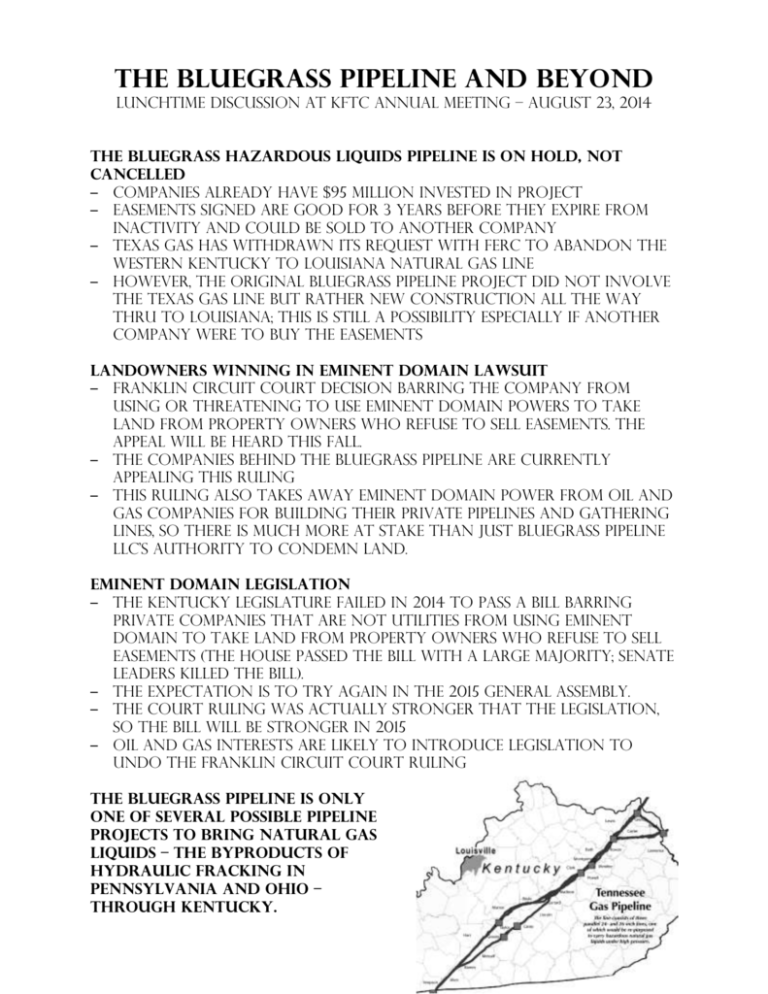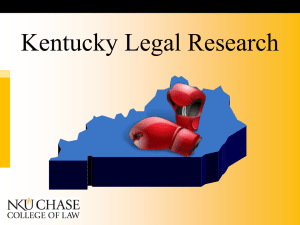Bluegrass Pipeline updated handout
advertisement

The Bluegrass Pipeline and Beyond Lunchtime discussion at KFTC Annual Meeting – August 23, 2014 The Bluegrass Hazardous Liquids Pipeline is on hold, not cancelled – companies already have $95 million invested in project – easements signed are good for 3 years before they expire from inactivity and could be sold to another company – Texas Gas has withdrawn its request with FERC to abandon the western Kentucky to Louisiana natural gas line – however, the original Bluegrass Pipeline project did not involve the Texas Gas line but rather new construction all the way thru to Louisiana; this is still a possibility especially if another company were to buy the easements Landowners winning in eminent domain lawsuit – Franklin Circuit Court decision barring the company from using or threatening to use eminent domain powers to take land from property owners who refuse to sell easements. The appeal will be heard this fall. – the companies behind the Bluegrass Pipeline are currently appealing this ruling – this ruling also takes away eminent domain power from oil and gas companies for building their private pipelines and gathering lines, so there is much more at stake than just Bluegrass pipeline LLC’s authority to condemn land. Eminent domain legislation – The Kentucky legislature failed in 2014 to pass a bill barring private companies that are not utilities from using eminent domain to take land from property owners who refuse to sell easements (the House passed the bill with a large majority; Senate leaders killed the bill). – the expectation is to try again in the 2015 General Assembly. – the court ruling was actually stronger that the legislation, so the bill will be stronger in 2015 – oil and gas interests are likely to introduce legislation to undo the Franklin Circuit Court ruling The Bluegrass Pipeline is only one of several possible pipeline projects to bring natural gas liquids – the byproducts of hydraulic fracking in Pennsylvania and Ohio – through Kentucky. – – – – – the Kinder Morgan / MarkWest proposed NGL line would repurpose a natural gas pipeline to carry NGLs from Ohio to Louisiana the pipeline is 50-60 years old and was build with materials and welding techniques now considered obsolete capacity would eventually reach 400,000 barrels per day (a barrel is 42 gallons) Kinder Morgan has a poor safety record for pipeline accidents and workplace safety violations cited by the U.S. Occupational Safety & Health Administration In 2004, a 4-inch NGL pipeline operated by Mark West Energy in Floyd County, Kentucky exploded, incinerating five homes and sending nine people to the hospital. NGL pipelines are just the leading edge of the danger hydraulic fracking poses to Kentucky. There are thousands of small mostly nitrogen fracking operations in Kentucky that have been disrupting or poisoning groundwater resources for decades, though not NGL production in Kentucky is on the to the scale seen in recent years in rise with the introduction of horizontal Pennsylvania, Ohio, North Dakota drilling and deeper wells. The Ranger and Colorado. The potential for NGL line, completed in 2012 and owned this to change for the worse is by MarkWest, runs through eastern growing with the drilling of deeper Kentucky to a “fracination” plant in wells in northeastern Kentucky South Shore. using hydraulic fracking, and the potential for increased drilling in the New Albany Shale in western Kentucky. Kentucky laws and regulations are insufficient to prevent the kind of damage to land and water suffered by residents in hydraulic fracking states. Kentucky has a choice whether to embrace or tolerate the destructive operations of increased oil and gas fracking and burning, or choose of different path forward for meeting our energy needs. – much of the oil, gas and related products produced in Kentucky will go out of state, and (based on experiences in PA, OH and ND) many of the related jobs will not go to local residents – the Clean Energy Opportunity Act support by KFTC and the Kentucky Sustainable Energy Alliance could create 28,000 new jobs over the next 10 years (independent estimate) while – – providing more stability to energy costs and lowering dependence on fossil fuels the Clean Energy Opportunity Act and related legislation needs to approved by the Kentucky General Assembly, and they will have the opportunity to do so in the 2015 legislative session. more information at www.kysea.org More information Bluegrass Pipeline – For background on the Bluegrass Pipeline, go to http://stopbluegrasspipeline.us or http://nobluegrasspipeline.com/ – http://bluegrasspipeline.com/qa-bluegrass-pipeline/ This Q & A from the Williams Co. website provides the unvarnished truth about the status of the BG Pipeline. About fracking – Kentucky Waterways Alliance: http://kwalliance.org/what-wedo/clean-water-policy/pollution-prevention/fracking-ky/ – National Geographic: http://news.nationalgeographic.com/news/2010/10/101022-breakingfuel-from-the-rock/ – Food and Water Watch: http://www.foodandwaterwatch.org/water/fracking/ The grassroots group opposing the Bluegrass Pipeline, other pipelines and hydraulic fracking in Kentucky is planning a summit this fall, probably Saturday, November 8 in Lexington, to discuss all these issues and how to deal with them. Keep checking the KFTC website, KFTC.org, for more information.





